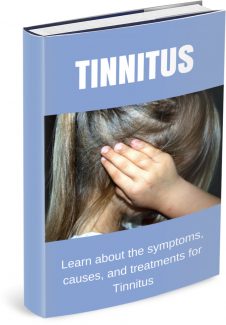
 License Type: Master Resell Rights
License Type: Master Resell Rights  File Type: ZIP
File Type: ZIP
 SKU: 62384
SKU: 62384  Shipping: Online Download
Shipping: Online Download
Sample Content Preview
Tinnitus 101 – What You Need to Know About Tinnitus
If you ever experience ringing in your ears, it might be from a condition called tinnitus. While not a medical condition on its own, tinnitus is a term used to determine if there is another condition of your ears you need to be concerned about. In the coming pages, you will learn about tinnitus and what can be done about it.
What is Tinnitus?
Tinnitus is the medical term for phantom ringing you hear in your ears. This means that the noise is not happening in your environment. For instance, no one can hear the ringing but you. Tinnitus is common because it affects about 1 in 5 individuals. Although it affects your ears, it is not a medical condition. It is classified as a symptom resulting from an underlying medical condition. An underlying medical condition is classified as a disease, infection or disorder of some type.
If you have tinnitus, you may suffer from one of two types of the medical symptoms: subjective and objective tinnitus. Subjective tinnitus can only be heard by you. Subjective tinnitus is the form of tinnitus people commonly develop.
It can develop because you had medical problems with your inner, middle or outer ear. In addition to problems hearing, your auditory nerves may also be affected. Your auditory nerves, located in your brain, is responsible for interpreting the nerve signals that you hear into sounds.
Objective tinnitus is phantom noise your physician can hear while they are examining your ears. This is a rare form of the condition. It is often caused by issues with your blood vessel, muscle contractions or a medical condition in your middle ear bone.
The ringing in your ears is bothersome. However, it is not serious and is not fatal.
There is no cure for tinnitus. With treatment and identifying the underlying cause of tinnitus, you may notice improvement in symptoms.
1. Signs and Symptoms
The most obvious symptom of tinnitus is the ringing in your ears. You may not experience ringing in the ears, but a different sound such as buzzing, clicking, humming, roaring and hissing. The noise may occur intermittently.
This means you may hear the ringing in your ears, then it will stop just as suddenly as it started. You may experience throbbing and pain in your ears. The sound is a high-pitched sound that is continuous. Decreased hearing may also occur when you have tinnitus.
You may experience symptoms that are not directly related to the buzzing or ringing in your ears. These symptoms include depression, anxiety, difficulty sleeping and lack of concentration.
2. What Causes Tinnitus?
Researchers cannot find the exact reason why Tinnitus occurs. However, numerous health condition can worsen the ear problem. From what researchers have gathered, inner ear cell damage is the common cause of tinnitus. The delicate, small hairs located in your inner ear sway according to the pressure of the sound waves you hear.
Your ear cells are triggered to release the transmitted electrical signal to your auditory nerve and then to your brain. Your brain is responsible for interpreting the electrical signal as sounds.
Any time the delicate, small hairs in your inner ear become broken or bent, they do not work properly. Instead, they create electrical impulses that are randomly sent to your brain. Your brain is responsible for interpreting these sounds. This is how you hear ringing or buzzing in your ears when no one is ringing a bell.
The most common causes include:
1. Being in an environment with extremely loud noise. A concert, listening to music too loud and heavy equipment can cause tinnitus when you are exposed to loud noise.
2. Hearing loss that occurs because of age. Loss of hearing typically starts when you are 60 years old.
3. Changes in your ear bone. Your ear bone in your middle ear can stiffen and changes the way you hear.
4. Earwax blockage. Earwax blockage occurs because of wax buildup in the ear.
The next leading cause of tinnitus is medications. Certain medications can either cause the condition or make it worse. What happens is the higher the dosage of medication, the worse the ringing in the ears become. The phantom noise tends to disappear when you stop taking the medication.
Some medications are known to cause tinnitus or make it worse. For instance, some antibiotics and antidepressants may cause or worsen tinnitus. Taken in high doses, aspirin cause tinnitus or make tinnitus worse. Quinine medications and water pills, called diuretics, often cause tinnitus. Certain cancer medications like vincristine and mechlorethamine cause ringing in your ears.
Some medical conditions may cause this condition, but it does not occur very often. For example, head or neck injuries can cause damage to your brain and hearing nerves. The damage usually causes tinnitus in only one ear. Acoustic neuroma, a noncancerous tumor in your cranial nerve, can cause ringing in one ear.
Blood vessel disorders are also the cause of tinnitus. However, this link between blood vessel disorders and this condition is rare. Some vessels disorders that cause ringing in your ears include atherosclerosis, high blood pressure and turbulent blood flow.
3. The Risk Factors Associated with Tinnitus
Any person can develop tinnitus in one or both ears. However, certain factors can increase your risk of developing the condition. For instance, exposure to loud noise can increase your chances of developing tinnitus. Cardiovascular problems, such as high blood pressure or atherosclerosis, can increase your risk of developing this condition. Smoking and age can both increase the risk of developing tinnitus. Men typically develop tinnitus at a higher rate than women.
4. Possible Complications
Every medical condition has complications. Tinnitus is no different. These complications can be serious because the affect individuals differently. In fact, it may change your quality of life. Some complications that can occur if you have tinnitus include, but are not limited to memory problems, stress, fatigue, problems sleeping and fatigue. You may feel irritable for no reason.







